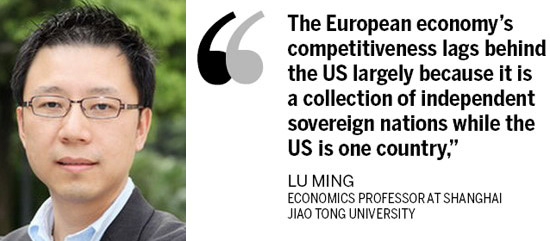Expert suggests caution over 'fragmented' urbanization
Updated: 2013-02-21 11:22
By Zheng Yangpeng (China Daily)
|
|||||||||||
Hundreds of new cities. Millions of new urban residents. Surging consumer demand as a result.
The world's media has been following China's ongoing urbanization process keenly, highlighting it as the nation's next economic growth engine.
But Lu Ming, an economics professor with Shanghai Jiao Tong University, says the government still needs to take a hard look at how exactly the urbanization process is being handled.
|
 |
Despite the exciting numbers involved, Lu said that China still has a lot of strategic thinking to do to choose the right development route for its cities, while not forgetting its largely agrarian central and western regions.
He suggests a more integrated approach is vital, in which the industrial coastal urban centers take in more inter-regional migrants and become more competitive.
Lu views as risky any plan which allows local governments in the central and western regions to develop their own cities and industries in a protected environment - what he refers to as "Europeanization", or a fragmented market approach with just a centralized currency and exchange regime.
He suggests the consequence could be the creation of a classic "prisoner's dilemma", in which two individuals, cut off from communication with one another, may not cooperate even if it appears to be in their best interests to do so.
In a similar way, any fragmentation of the market could lead to increased levels of local government protectionism, which could seriously harm the interests of other communities, or even contribute to overall national economic inefficiency and financial risk.
He uses the European model to illustrate his point.
"The European economy's competitiveness lags behind the US largely because it is a collection of independent sovereign nations while the US is one country," Lu said.
He added that China resembles Europe, not only in that its demography and culture vary a great deal from region to region, but also that a great disparity exists in different regions in terms of productivity.
The result is that Chinese provinces with lower productivity, such as those in the central and western regions, are like Greece - they are unable to raise their export competitiveness by lowering their exchange rates because they are part of a larger, unified monetary system.
China's exchange rate is largely based on the much higher productivity levels of the more industrialized eastern regions that account for the lion's share of exports.
As it is impossible to have separate local monetary policies, the competitiveness of China's central and western provinces is actually dropping in relation to the rise in value of the renminbi.
At the same time, due to the limited free flow of labor, those provinces still have to create new jobs for local residents, and invest in new industries.
Related Stories
Construction material sector profits up 3.5% 2013-02-19 17:53
Cost of living rises in cities across China 2013-02-06 07:31
Investors home in on urban growth 2013-02-04 02:44
China to help migrant workers in urbanization 2013-02-01 10:54
China steps up rural land registrations 2013-02-01 09:16
More new loans to be used in urbanization programs 2013-01-30 09:42
Today's Top News
Police continue manhunt for 2nd bombing suspect
H7N9 flu transmission studied
8% growth predicted for Q2
Nuke reactor gets foreign contract
First couple on Time's list of most influential
'Green' awareness levels drop in Beijing
Palace Museum spruces up
Trading channels 'need to broaden'
Hot Topics
Lunar probe , China growth forecasts, Emission rules get tougher, China seen through 'colored lens', International board,
Editor's Picks

|

|

|

|

|

|





